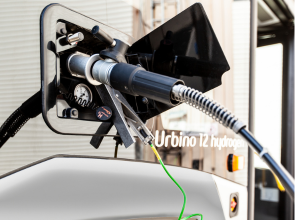Stellantis unveils hydrogen-powered vans
The plug-in hybrid fuel cell vans will be installed with both fuel cell technology and lithium-ion batteries

Stellantis, a multinational automaker, has also joined the hydrogen fuel cell electric vehicle bandwagon by unveiling its new range of hydrogen vans to be launched by the end of this year, H2 Bulletin reports.
The company announced on 31st March to introduce the fuel cell version of Citroen Jumpy, Opel Vivaro and Peugeot Expert. These hydrogen-powered versions would fall in the plug-in hybrid category as they would also carry batteries but replaces the internal combustion engine with a fuel cell system.
The van would be installed with three high-pressure type- IV tanks capable of storing 4.4 kg of hydrogen. These tanks would be refuelled within three minutes and come up with a range autonomy of more than 400 km. The fuel cell stack will use a proton exchange membrane (PEM) of 45 kW power.
Dr Lars Peter Thiesen, Manager Hydrogen and Fuel Cell Deployment Strategy at Stellantis, said, “For the first time in more than 100 years of automotive development, hydrogen and fuel cell technology has bought us far beyond the automobile. Today, hydrogen is seen as the central element of a future integrated and efficient energy system – free of fossil fuels. As an energy carrier, hydrogen will connect the areas of power generation, heat supply, industry and transportation.”
Stellantis is a multinational automotive manufacturer headquartered in Amsterdam, the Netherlands. It was formed through the merger of Italian-American company FCA (Fiat-Chrysler) and French company Groupe PSA (Peugeot-Citroen, Opel) on a 50/50 cross-border merger agreement in January 2021.
Assembly of Stellantis plug-in fuel cell electric LCV will be completed at the Opel Special Vehicles (OSV) facility in Riisselsheim, Germany, where Stellantis’ global Centre of Competence Hydrogen & Fuel Cells is also located.
To develop the two main system components, which are the fuel cell stack and the hydrogen storage system, Stellantis has entered into strategic partnerships with Faurecia and Symbio, which are currently developing these components.
Faurecia will develop, supply and assemble hydrogen storage systems in Bavans, France. Symbio is Faurecia’s joint venture with Michelin. It develops a compact, low-weight fuel cell system delivering 45kW gross power for Stellantis. These systems will be produced in France at Symbio’s Venissieux facility and, from 2023, in its new St Fons site.
Last week, Renault also disclosed its new light commercial vehicles (LCV) line up revealing a new Master Hydrogen van at the end of 2021.
